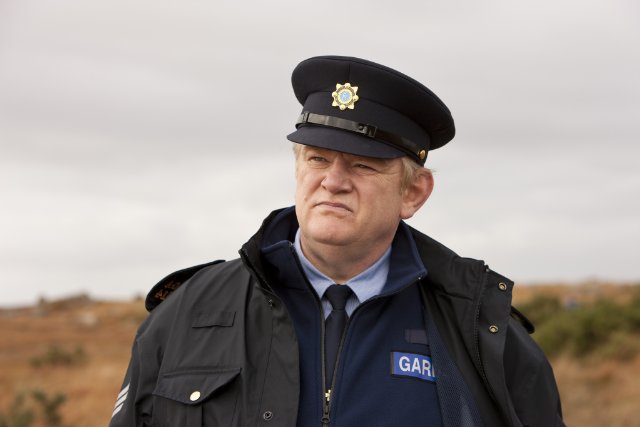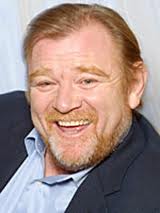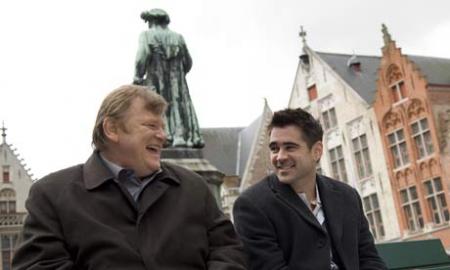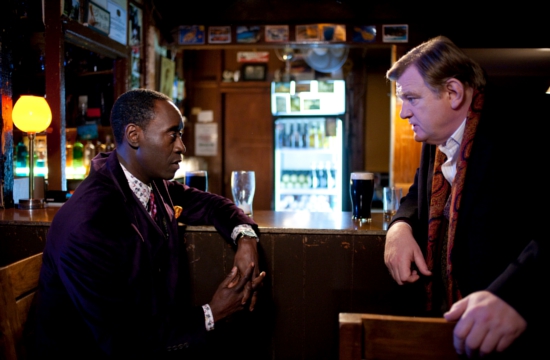
Brendan Gleeson can walk onto a movie to do a five-minute part and blow you away with it (“A.I.,” “Gangs of New York,” “Braveheart”). To have watched him ten years ago was to gain the premonition that he would one day carry a movie with something wonderfully cagey and grouchy. He got that chance in 2008 when he played a conscientious hitman in “In Bruges” for director Martin McDonagh, a first-time director. Now he is working for his brother and first-time director John McDonagh in the newly released “The Guard” If the movie Gods are paying attention, he should at least get nominated for a Golden Globe for Best Actor in a Comedy. The film is best described as a comic thriller with politically incorrect exchanges between his Irish policeman and an African-American Fed Agent from the West played by Don Cheadle. Sample dialogue: “You did a helluva job how you burned all those kids at Waco.”

Gleeson came to Los Angeles to speak about his meaty role.
This part seems so perfect for you but it was not specifically written for you. Were you able to put your stamp on it, and what do you think that was?
I don’t know if I put my stamp on it or not or whether it was there on the page to begin with. All you’re trying to do is to realize the script and bring it into reality.
Did he remind you of somebody or people you’ve known?
Yeah, but I couldn’t be specific about it. I meet these guys a lot. Anybody who’s ventured into the wilderness of middle age understands disillusionment, you know? I think this guy is profoundly disillusioned and I think he’s also profoundly lonely.
Don said that he was really looking forward to working with you. How was the first meeting you had with Don about the movie?
It was in L.A. actually, we had both decided to do it. I was really delighted when they said that it had gone out to him and I was even more delighted when he said he was going to do it. I was surprised how quickly that happened, but I was absolutely over the moon. I love his work, and I kind of felt, you can feel intuitively that there’s a kind of integrity going on there that you don’t even have to question. Then we got into, we managed to get together for an afternoon in L.A. about a month or two before we shot, and we had a reading through it with John McDonagh [the director]. We spent an afternoon kind of just testing the water and seeing how it came out. From that it was a kind of looking up all the time and we couldn’t wait to get the whole thing going.
You’ve worked with both brothers, can you compare and contrast? This was really John’s first big film.
Yeah, well the way I explain to people, the comparisons, I remember saying to him, “Okay John, before this thing starts, it’s going to be the comparison / comparison.” I told him that like, last year. I said, “You’re going to have to find some way to get your head around that,” and he said, “No, I know, it’s not a problem.” It is kind of a problem a little bit when everybody insists that because there’s one genetic, you know, there are obviously similarities in their work in the tone and in the sense of humor, the ferocity of it. They write in a very fierce sort of way, and it’s part of the reason that they’re so brilliant, because of the vigor they put into their writing. They don’t tolerate glibness, or half-measures, or “Let’s have an entrance here for the sake of it.” They’re very tough, so that’s the common thing.
 Brendan Gleeson in “In Bruges.”
Brendan Gleeson in “In Bruges.”
But the words are completely different, the voice is completely different. And you know my easy way out of it, what I’ve come over the last while as we’ve started to bring the film out here is anyone who considers it’s pretty much the same thing, just take any character from either film, “In Bruges” or “The Guard,” and say, put it in the other one. It’s impossible. If you take Boyle and put him in “In Bruges,” really it’s not working. It doesn’t feel right, the tonality is different, the whole voice is different. So the worlds are separate. For me they obviously have particularly high standards that are unusual, never mind in the same house. They share that and they do have kind of a fierce sense of humor, but different voices.
Is there a kind of a different comfort level when working with an Irish director?
Not necessarily. Cultural difference really is about how people channel universal feelings. It’s amazing, I find accents really interesting, you always find out so much about a person from their accent. Just things like what makes them laugh, or if you hear something in a particular accent it can be really, really funny that makes no odds in a different one.
Would you like to play this character again if he lived?
If he lived, I don’t know we’ll have to find out.
Do you want him to have lived?
Well my answer to that is okay, I always felt that he would have in some way worked it. But when I did the walk down the pier, I found that he was really, he didn’t care. There’s a stoicism he’d reached whereby, and it wasn’t even that it was more of an emptiness. He’s asked has he any, Don says who will he contact, and he says, “I have nobody.” And he just tosses it off but that’s the reality of it. He’s just fed up with being alone, and I don’t think it’s in any way a suicide thing or a death wish or any major. But I think he’s gone beyond the state of caring, all he knows is that he wants to do, I think have been wanting confrontation like this all his life whereby he kind of steps up to the mark, he’s been always wishing for a situation whereby, because it’s so unusual in life to get a clear-cut challenge and know, okay, this is the force of God against the force of evil. It doesn’t happen like that. Mostly it happens in small compromises. People looking the other way. Not seeing what you definitely did see, or pretending not to see it, or telling yourself that you didn’t see it, or whatever it is, but a really clear cut chance to say, okay, this is either stand up or runaway time. I think he’s been wanting one of those since the time he joined the police force, and all he got was small time traffic tickets and small bribery corruptions, small stuff.
That starts when he puts on that uniform.
I think so, yeah, when he puts on that uniform I think he wants, and actually not a lot of people know this, and couldn’t be expected to know it, but the wardrobe person, we were kind of thinking, has he got a ceremonial uniform? Because they don’t do a lot of ceremonies, they don’t do all that stuff very much. But what she came up with, which I thought was brilliant, was that the uniform is the old guard uniform that was worn up to about the mid-eighties I think. The idea was that he is going back to what he thought he was joining. So when he dresses himself up like that it’s not about having something different, it’s about going back to what he thought he was doing when he joined in the first place. So I thought it was really cool.
Is there a scene that, having seen the movie, went over better than you thought it would when you read the script? Or was there a part that you thought might go over some people’s heads, when you were talking about women in Dublin and stuff like that?
I’m from Dublin by the way, just to let you know. So is my wife, actually.
I’m sure she’s a nice lady.
By that note, I honestly didn’t know. Me and John went down to Sundance, and it is a big question. We were trying to say earlier, really you’re obviously trying to deal with universal issues, but a lot of the time you’re trying to do it in a local context because you understand what’s going on. There’s always a kind of a feeling of okay, does his have any relevance to anybody outside of the community? We have a film that’s quite specifically Irish in the sense that the sense of place is very real, the sense of everything, the whole culture, it’s like a character in the film almost that Don’s character has to come to terms with. There’s a difference here between the way we carrying on. And then they started making connections between, “Yeah, this is like Harlem,” or whatever he says, “Compton,” he says. You kind of say yeah, you find the place where stuff is starting to cross and all of that. But it is so our own thing, we didn’t know whether people would be able to accept it or not. I particularly do think an American audience was able to say, “Okay, take me by the hand, I’m not mad, he should not be saying these things. This is outrageous behavior,” and they kind of felt in some way that they had a friend in there.

Did you rehearse?
Not on this very much, we didn’t. We had one discussion, normally if I can I do, and especially if we have writing as deep as this I do if I can, but it’s very, films are so hard to get made in the first place. The notion of putting a rehearsal into the budget seems to be almost impossible. So we did in “In Bruges” have those two weeks with Carl and Martin and we sat around and went at it and it was fantastic, and with this we had an afternoon with Don and John in a room like this and that was it. We usually don’t have the choice.
When you were teaching and you got into acting, because you had been an actor and then you went into teaching, and then you went back into acting right?
Well, I started, I taught for ten years, but during that time I was acting but it was never enough to make my living out of it. It was always something I wanted to do in my own terms, put it that way.
But what was it that brought you back again, put it that way.
As I say, it wasn’t really the question of, I would have never called myself an actor before. I wouldn’t have called myself that. So it was a big thing, my big thing was actually putting “actor” down on my passport, that was my big thing. I kind of was suspicious of the word in a way. It seemed the press that it got, there was a lot of hustling that has to go on, which is true, a lot of back biting, which is kind of not true, actually. Most people are idealistic and most people in the profession are profoundly creative and committed. But I don’t think it was really for me in some odd way. And then I had written a few plays and I had put on a few shows, put a concert on at school, and something was beginning to dawn on me that the day was too short and I’d have to kind of make a go for something. So I talked to my manager and he said we can have a go at it.
John mentioned that you’re actually going to be working on another project together where you play a priest. Can you talk a little bit about that character?
Yeah. Basically he, John and I were talking on one stage, and the subject got onto religion and all the rest of it as it does, guess where we were. But we were talking about the notion that it must be really rough to be a good priest at the moment. Particularly in Ireland or somewhere like Ireland where, for a while it was such a reverential thing going on, it was too much, where the Priest was very much, you know, there was no other power above and in Northern Ireland people were very deferential towards them, I remember being told as a kid, “Make sure if a Priest goes by or someone important you salute them properly.” Now within a space of fifteen years or so, it’s completely turned around. People have lost their faith. It must be really interesting to be a really good guy now in the middle of all of that. So we’re going, the character is a good Priest who is revived by his community. John has written a brilliant piece of work.
Do you know when you’re going to get started?
I’m hoping next summer. We’ll have to see this through and get it financed and do all the usual boring, dull things. We’ve been kind of tossing it to and fro and it’s a really, I just want to get at it again.




